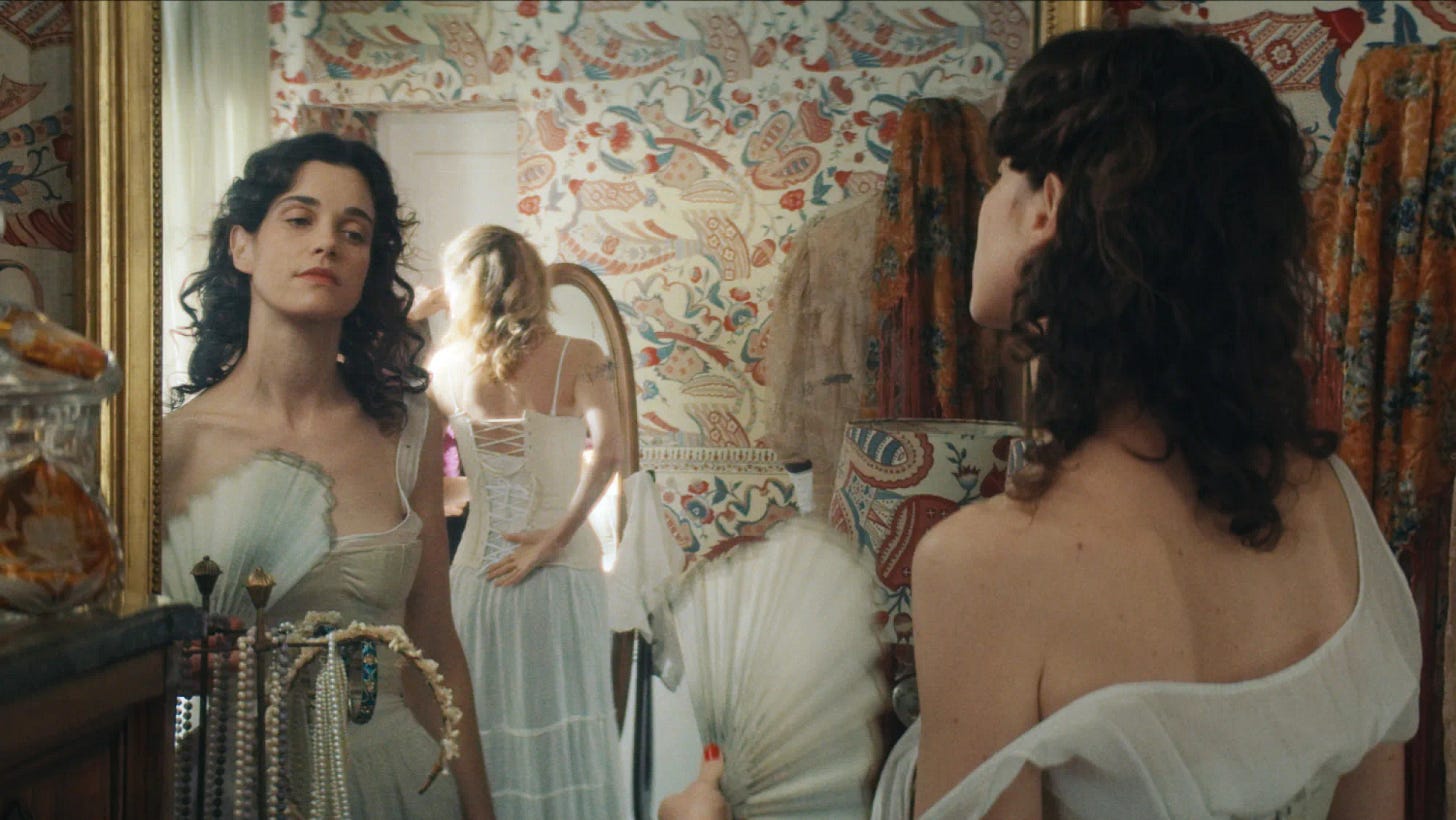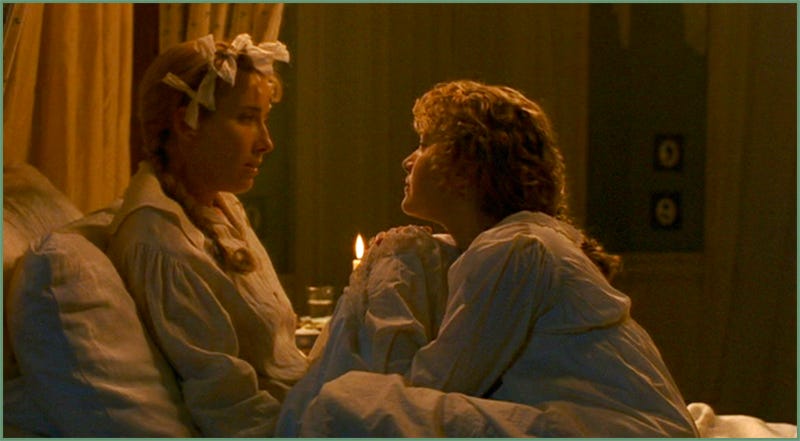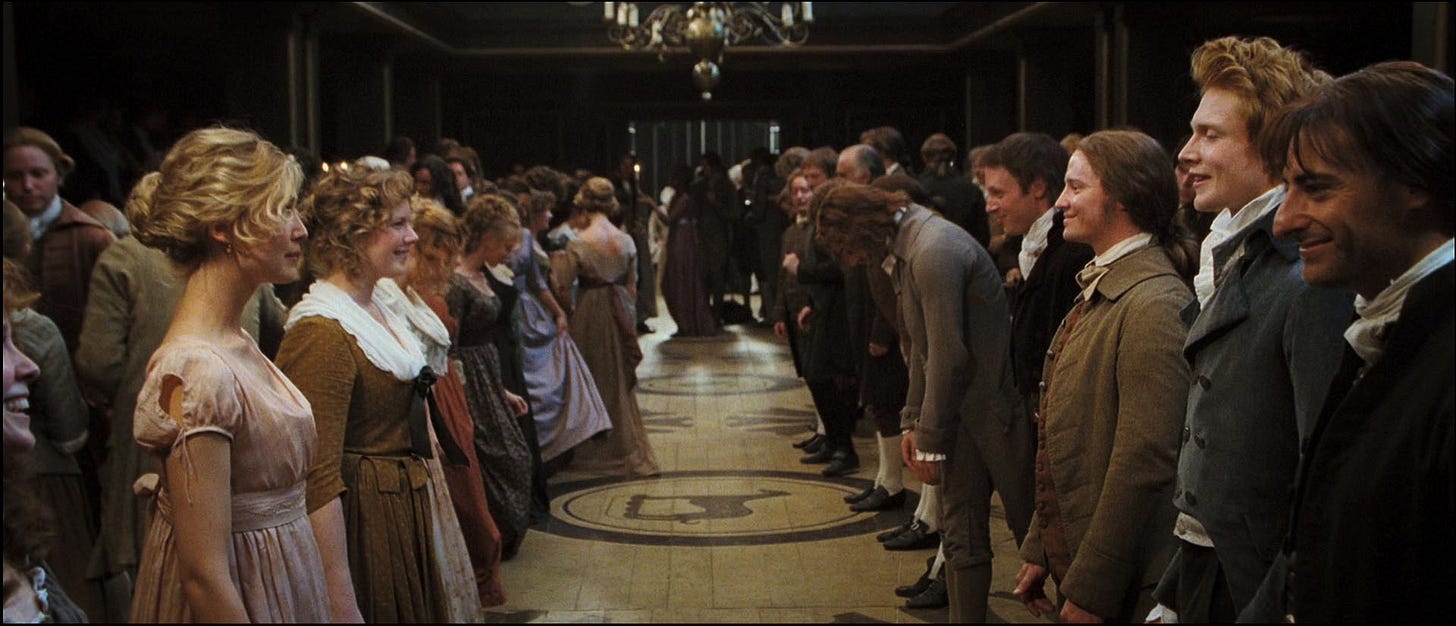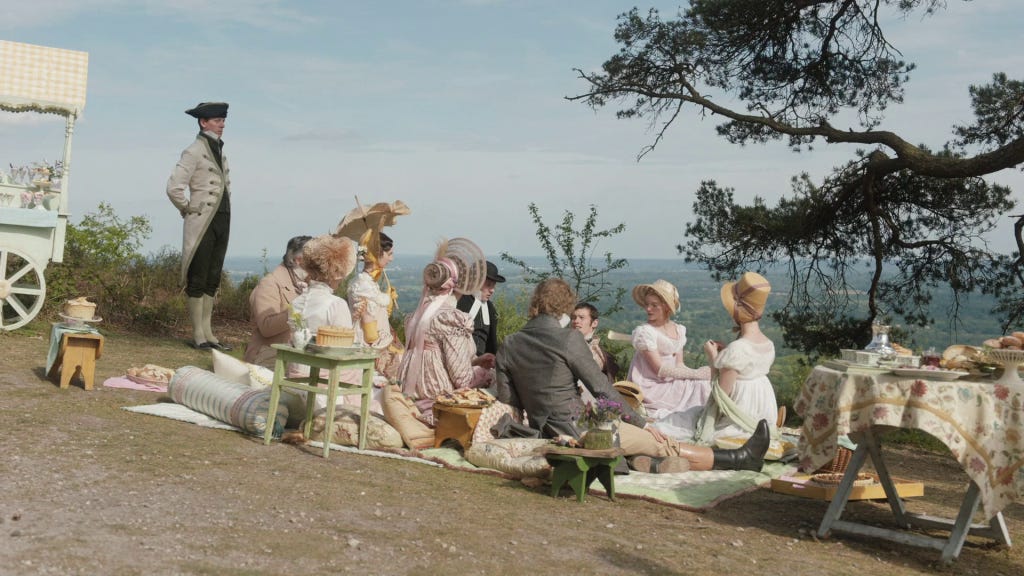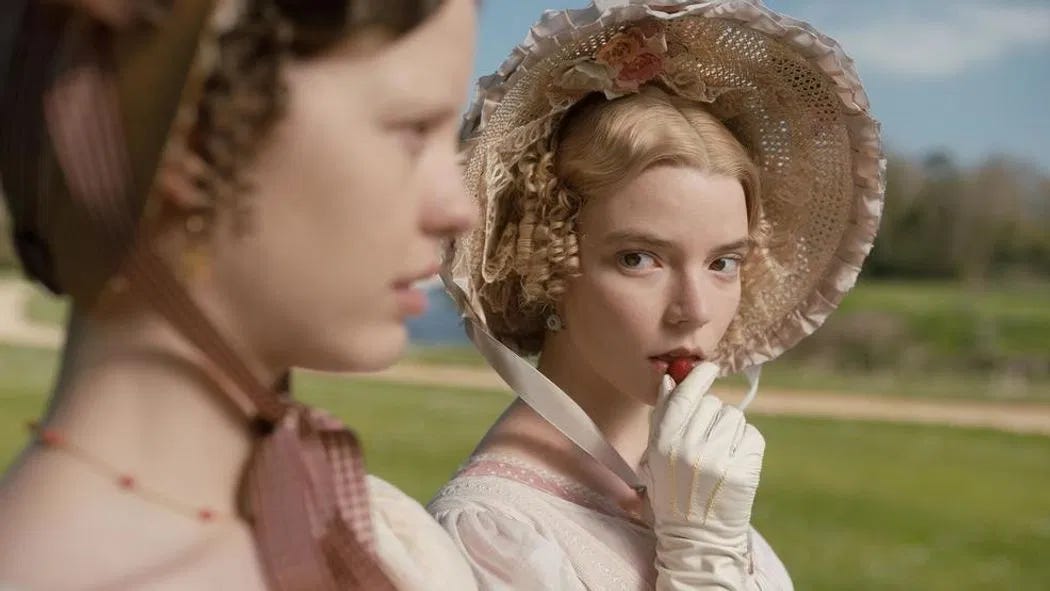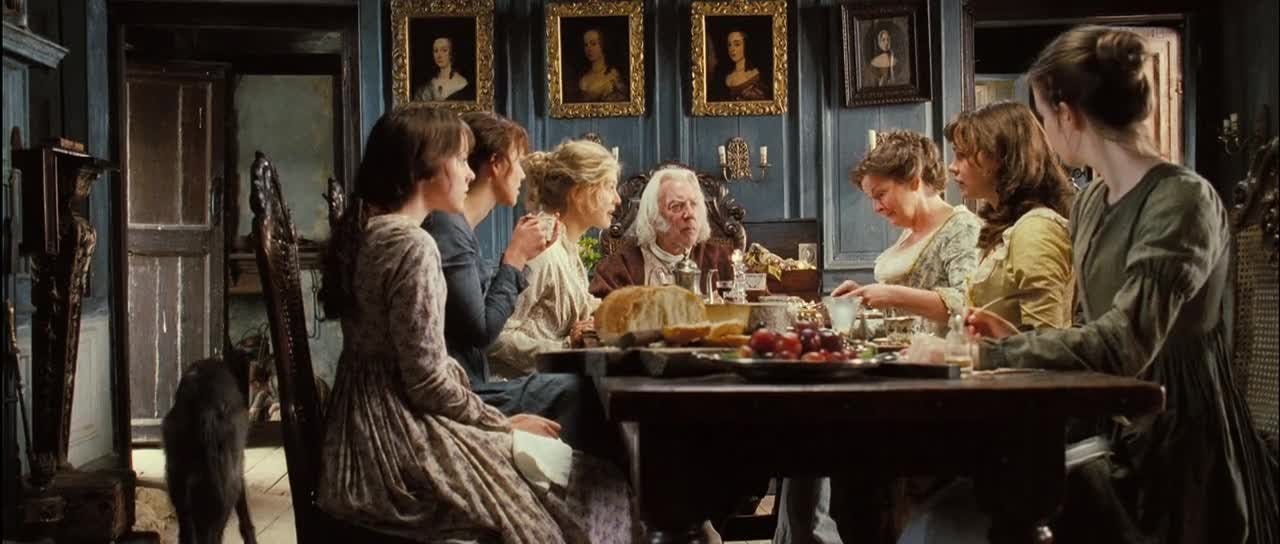On Recessions: Economies prefer predictability. When they're hit abruptly with wars, pandemics, or international financial collapses, the resulting instability and uncertainty can send companies and people into a panic. Unexpected shocks in the world.
I had the pleasure of seeing Jane Austen Wrecked My Life on the first Sunday in June in a shockingly packed theatre for a film with subtitles at 4:30pm. But then again we were at the only AMC that matters—the location at Lincoln Square in New York City, which famously shows more “cinema” than the others put together. It is shocking how much you really do have to go out of your way to see something other than the live action Lilo & Stitch.
The film, a French-English duo-language, sensory picnic by writer/director Laura Piani, is simple and almost reminiscent of a different era of the romantic comedy. It follows Agathe (Camille Rutherford) through her stumble into the Jane Austen Writing Residency in the English countryside after a rather stagnant existence working at the famed Shakespeare in Company bookstore in Paris, France. There, she finds herself unable to write. Distracted by her past but also whether the latest love of her life should be her best friend back home Felix, or the Hugh Laurie look-a-like Oliver who picked her up from the ferry in his hot, little convertible.

I had good time. I chuckled in my seat next to a white-haired woman flying solo, gawked at every interior that featured wallpaper and leaned over to whisper to my sister when Pablo Pauly was on screen, “you see, he’s more my type”. It did occur to me while sitting through Jane Austen Wrecked My life that the last time I had come to this very theater was for the Pride and Prejudice (2005) theatrical 20th anniversary re-release only a month ago. Which made me feel very “Jane-Austen-American-Cat-Lady” to anyone who listens to Sentimental Garbage—an inside joke between Caroline O’Donoghue and Cariad Lloyd during one of her episodes on P&P where they joke about these American women who become so hyper-fixated on Austen they seemingly always end up with a cat named Mr. Darcy. I could’ve been that so easily. Let’s face it, I am that. At the very least I’m gay (subversive) and hold the hand of a lil’ butch instead of a towering man with a quizzical brow.
She seems to be in the zeitgeist quite a bit these days, Jane. But does she ever really leave it? A Jane Austen exhibit opened this month at the Morgan Library here in New York, Joe Wright’s Pride and Prejudice anniversary brought the girlies into the theatre and Dolly Alderton (author of the phenomenon Everything I Know About Love) is working on the latest adaption of P&P starring Emma Corin. It also wasn’t that long ago that the odd girl-boss Persuasion (2021) was released via Netflix and, the much more effective, Emma by Autumn DeWilde premiered in 2020. Even contemporary explorations of the work continue—Joel Kim Booster’s Fire Island premiered in 2022 and The Bridget Jones’ franchise continues to spawn film after film decades after its original release. If you compare her work to those equally prolific as Shakespeare of Dickens, would you see as much mainstream noise? Aryanna Alvarado writes for Screen Rant,
During its opening weekend in April, Pride & Prejudice opened at number six, beating out newer releases like Snow White and Drop (via Box Office Mojo). Despite being accessible to stream or purchase online, audiences made sure to show up at theaters for Pride & Prejudice, demonstrating just how beloved a film it is.
It’s been rough out there. Eggs cost as much as a downpayment in the 1950’s, you can’t spend five minutes on the internet without seeing some ugly AI art of a Bengal Tiger dressed as Captain America but still Jane Austen permeates. But what makes Jane Austen a comfort? What makes her appealing to us during uncertain times? What makes her feel timely, relevant—and as the kids say, a Recession Indicator?
Falling on Hard Times & Romanticizing Candlelight — we can’t afford our con-ed bill, babe
In Sense and Sensibility the Dashwoods fall on hard times. I say “hard times” but really they just have to leave their estate for a medium-sized country home. Listen, I know so many of us are asking, “where do I sign up to rough it out in a cottage?” I get it. I’m more likely to find a chest of pirate’s booty at Rockaway Beach than receive an inheritance of any kind and there are days where an allowance (even one of $50) would really rock my socks off.
But Jane Austen isn’t trad-wife fodder (even though you really have to be on the lookout lately), it’s in fact the opposite. Austen’s first work of fiction has so much to say about money, power and women’s agency in society. The Dashwood girls are turned out from their family home after the death of their father because they are unable to legally inherit. Their half-brother, although promising his father that he will take care of them, ultimately decides that Mrs. Dashwood (a widower!) and her three daughters cannot remain at the estate. Essentially banishing them with a fraction of their family’s money to build a new life miles from home.
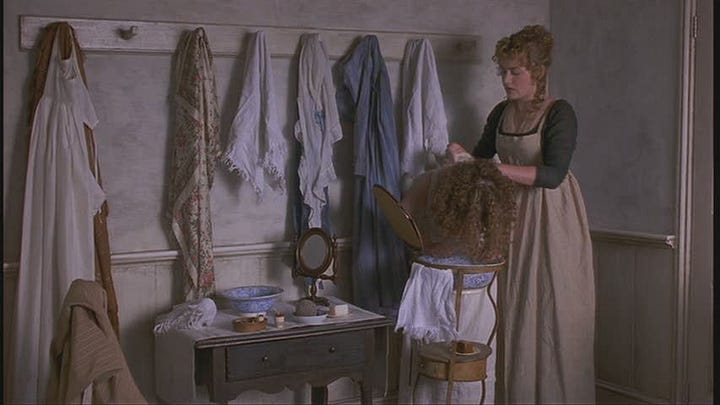
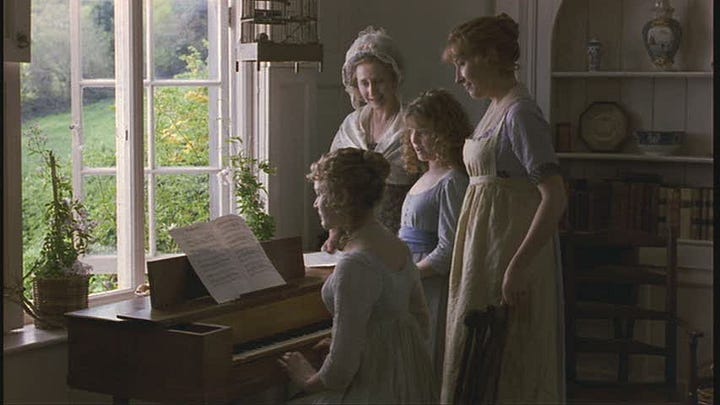
Pinching pennies? Starting over? Turning the lights down low to conserve energy and calling it “ambience?” It’s giving “recession.” It’s giving, cutting out coupons. If you lived through the 2008, it’s that too. It’s almost soothing (and I’m specifically talking about the 1995 Ang Lee adaption here) when Elinor rushes to blow out the candles and scramble into bed to try and avoid the frigid night air of the cottage—only for her sister, with who she now has to share a bed, to mutter, “Your feet are cold.”
My parents have always been stingy with turning on the heat and I, much like Elinor and familiar with the benefits of a thick, wool sock. We can feel her shivering through the screen. But the film is gorgeous. It’s gritty and grounded—an oil painting with a happy ending. The long walks look like they would heal me, even as one nearly kills Marianne’s melodramatic ass for standing out in the rain (she is me, I am her.)
Indeed Much More Rational But Rather Less Like a Ball — no one’s @ the club and Hinge has all my prospects in Rose Jail
All of us here (intellectuals, critical thinkers, readers of all varieties) know that it’s far easier to romanticize something we simply weren’t alive for. As a queer person I’m not really in the business of indulging, “Huh, what would Caroline Bingley have to say about me and my relationship?” The nuts and bolts of the time period are spooky and I dare say we leave it there. Was it “easy” to find love in the Regency era? Well, no. But what I will say, is that technology has certainly app-ified the concept of “meeting someone”—even me and my partner reconnected through Instagram post-meeting at University at eighteen and being thoroughly unimpressed with one another.
Frustration with our phones has never felt more intense. Meeting people “out in the real world”, a kind of mythological concept that only a few get to live out. There’s even a recent revelation that dating apps algorithms might be “hiding” compatible profiles from us intentionally. The general concept encouraging consumers to stay on the apps for longer, or getting so frustrated they cave and pay for their subscription pricing. All the while, our social graces rust over. The art of “making a move” becoming lost in a shoot your shot text. Even in Jane Austen Wrecked My Life Agathe laments, “I have no interest in Ubersex.”
Rose jail: a term used on the dating app Hinge to describe the experience of being limited to seeing profiles that are considered more attractive or "standout" profiles, often requiring the use of "Roses" (a paid feature) to view them.
Cocktails average anywhere from $15-20 dollars if you want to risk your odds at the club—not to mention there might be a cover at the door. And even then the one time I bravely kissed a stranger on a night out, my “reward” was being asked for my Snapchat by a grown man. Is it any wonder that we might be left starry eyed by the general concept of forced proximity where everyone is forced to wear their favorite little outfit?
Everybody Knows Everybody (ie. the Power of a Good Picnic)
I’m brave enough to admit that when I send a Partiful invites out for a simple dinner or theme night I can sometimes feel like a digital beggar, inquiring after my friend’s availability through Computer. My social life is sometimes scheduled two to three weeks in advance, and that is by necessity. I’m bad at it. Obligations are everywhere, American urban planning keeps us separated by design (unless you’re living on a college campus) and we’ve gamified the 5-9 to the point that if you’re not running to the gym, meal-prepping or attempting every kind of self improvement after work you’re not really succeeding. It’s enough to yearn for an idealized version of community that even in Austen’s day, was only afforded by those from some kind of gentry.
It’s almost like a salve on a rough scab to briefly escape to small communities where invitations come in little envelopes on silver trays and not with yet another group chat. Yeah, in theory I know the internet has opened up my world and if I was forced to only socialize with the people I met in Middle School I would actually start begging for a lobotomy—but I love the intimacy of Austen. When someone new comes to town it is essentially their Eras Tour (think Frank Churchill). Imagine how clear headed they all must feel in their muslin gowns, gossiping about one of the twelve people they break bread with!
Post the disaster of the 2024 Election lectures about the vitality of Community—with a capital “C”—are seemingly everywhere. Being isolated and oddly toxic about our individual independence is only leading our society down the path of becoming weird little self-centered ego-ghouls. It isn’t random that Emma Woodhouse, Austen’s most “unlikable” and unreliable narrator, only becomes a more empathetic version of herself through making mistakes in her social circle and putting her pride aside when Mr. Knightly ultimately chews her out for it. All of this happens at a picnic. What I wouldn’t give for character development at a picnic.
There Isn’t Going to Be a Swimming Pool You Stupid Sl*t, There Won’t Even Be a House — the homeowner thing.
The world is waking up and possibly letting millennial greige glide into our collective rearview mirror. Once the coolest thing a house could be was “sleek” and “clean”, no more. I stand in solidarity with the thousands lamenting the casualties of homes with character—complete with hand carved banisters, pink tiled bathrooms and kitchen cabinets with knobs. The ones lost (“flipped”) to home content on TikTok and painted off-white from head to toe. It’s enough to make a guy want to shake their fist and shout, “if I had your budget, you wouldn’t catch me covering an antique fireplace in Valspar!”
When I watch anything Jane Austen, specifically the 2005 Pride and Prejudice, I always get stuck on how well-made everything looks. I get so sick of the light-as-a-feather, stiff-as-a-board, mid-century modern, Ikea-Wayfair nonsense that seems to be everywhere—labeled A, B and C as if its convenience can make up for the fact that in 6 months your new Swedish bed frame will be shaking like a leaf. Meanwhile, there is something to heavy furniture that says “I live here” as opposed to “It’s just a rental”. The aesthetics, even if not fully accurate to the period, remind me of my grandparent’s house in the South of Chile, where my Dad would point to the frames the paintings were hung in and show me how to tell if they were handmade.
I remember realizing at twenty-three that I had free will and could decorate my own home to be solid and familiar and even have a sense of humor. When I watch anything Austen, there are details I’ve never considered (and can’t afford) that make me close my eyes and reference a Pinterest board I keep just in case one day I experience a drastic change in my financial circumstances and can buy property—or rent a two bedroom with a partner in New York.

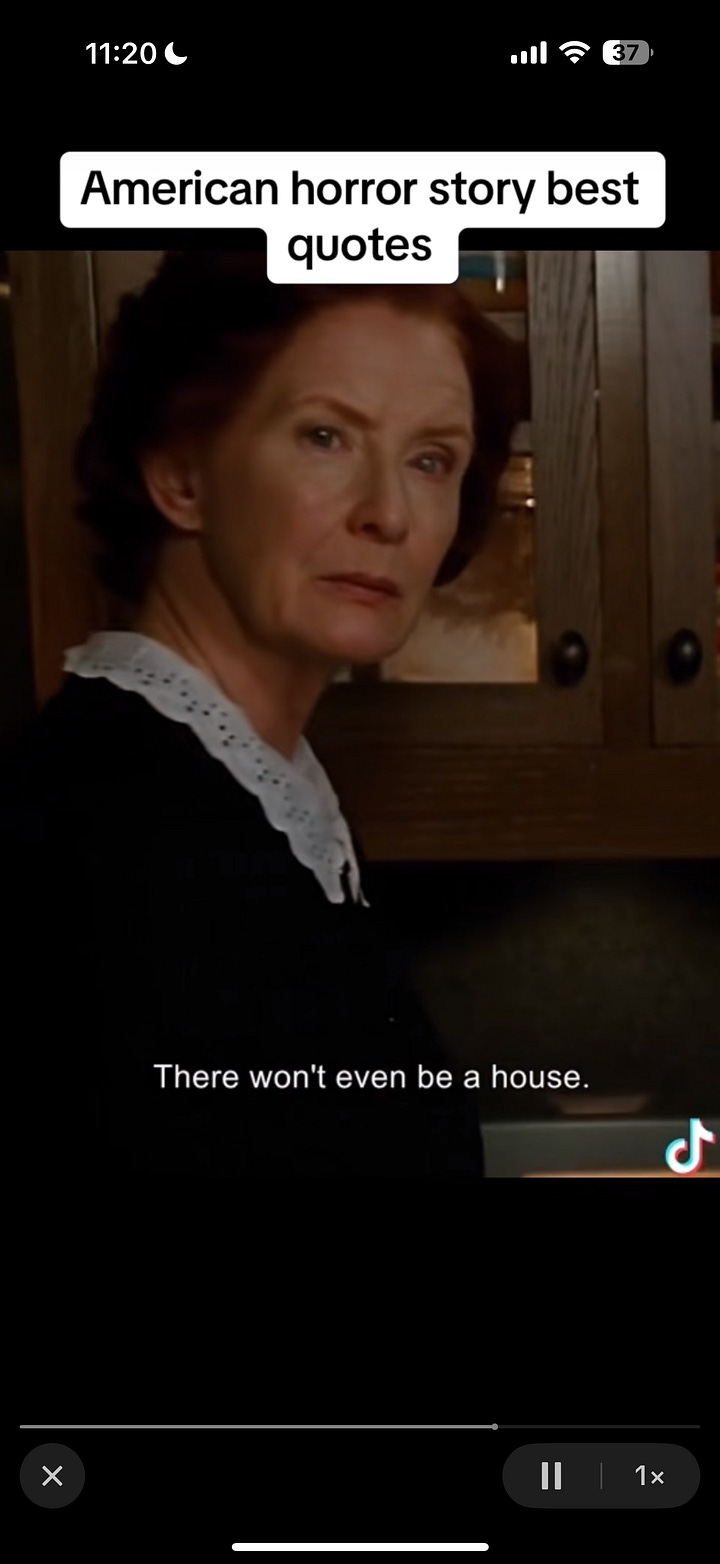
But hey, Austen’s heroines couldn’t own property and neither can I. Sure, what’s standing in their way is an additional hundred years until The Married Women’s Property Act of 1870 and for me its a housing crisis, but unfortunately their panic is relatable. Famously I love feminism but the financial privilege of being partnered and living a dual-income lifestyle is real, women online daydream of stumbling into a relationship with hotties with deep pockets all the time. Maybe because there is no universal healthcare in the United States, housing shortages plague anyone from NYC to Missoula, Montana and everything is just too damn expensive.
I’m looking for a man in finance, with a trust fund, 6,5”, blue eyes.
There is very little that has played as consistent of a role in my life as Jane Austen. I love that she never seems to go away, I love even more that it seems to be a source of comfort during stress and strife. Jane pioneered fiction around behavioral observation, what makes us tick and I like to believe that she’d be tickled to pick up what I’m putting down.
To be really earnest and intense (not unlike my primo Lin Manuel Miranda), I remember feeling as if I had found a little piece of myself the night my eyes flew open trying to overhear the DVD that had been rented in the next room—Elizabeth Bennet was rejecting a marriage proposal and I thought there could be nothing more juicy than that. When I think of that little line “she knew who she was from a young age,” I think of me at nine years old with my brow furrowed watching Sense and Sensibility— thrilled and confused—waiting for the right moment to ask my Mom what on earth they were saying. I was always impressed by the answer.





